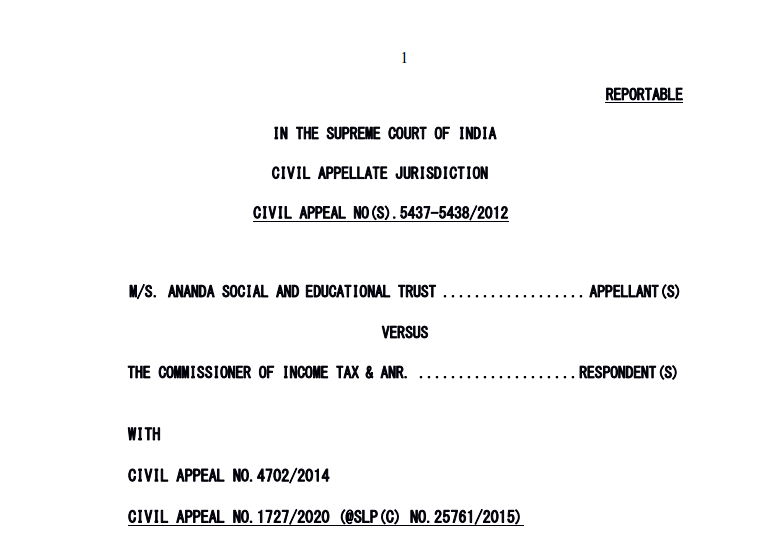Newly Incorporated Trust is entitled to 12AA benefits
Table of Contents
Case Covered:
M/S. ANANDA SOCIAL AND EDUCATIONAL TRUST
Versus
THE COMMISSIONER OF INCOME TAX & ANR.
Facts of the case:
This appeal has been preferred by the appellant – Director of Income Tax against the impugned judgment and order passed by the Delhi High Court holding that a newly registered Trust is entitled to registration under section 12AA of the Income Tax Act, 1961 (for short, the ‘Act’) on the basis of its objects, without any activity having been undertaken.
Text of Section 12AA:
“12AA. Procedure for registration:- (1) The [Principal Commissioner or] Commissioner, on receipt of an application for registration of a trust or institution made under clause (a) or clause (aa) or clause (ab) of sub-section (1) of section 12A, shall-
(a) call for such documents or information from the trust or institution as he thinks necessary in order to satisfy himself about the genuineness of activities of the trust or institution and may also make such inquiries as he may deem necessary in this behalf; and
(b) after satisfying himself about the objects of the trust or institution and the genuineness of its activities, he:-
(i) shall pass an order in writing registering the trust or institution;
(ii) shall, if he is not so satisfied, pass an order in writing refusing to register the trust or institution,
and a copy of such order shall be sent to the applicant:
Provided that no order under sub-clause (ii) shall be passed unless the applicant has been given a reasonable opportunity of being heard.
(1A) All applications, pending before the [Principal Chief Commissioner or] Chief Commissioner on which no order has been passed under clause (b) of sub-section (1) before the 1st day of June 1999, shall stand transferred on that day to the [Principal Commissioner or] Commissioner and the [Principal Commissioner or] Commissioner may proceed with such applications under that sub-section from the stage at which they were on that day.
(2) Every order granting or refusing registration under clause (b) of sub-section (1) shall be passed before the expiry of six months from the end of the month in which the application was received under clause (a) or clause (aa) or clause (ab) of subsection (1) of section 12A.
(3) Where a trust or an institution has been granted registration under clause (b) of subsection (1) or has obtained registration at any time under section 12A [as it stood before its amendment by the Finance (No. 2) Act, 1996 (33 of 1996)] and subsequently the [Principal Commissioner or] Commissioner is satisfied that the activities of such trust or institution are not genuine or are not being carried out in accordance with the objects of the trust or institution, as the case may be, he shall pass an order in writing canceling the registration of such trust or institution: Provided that no order under this subsection shall be passed unless such trust or institution has been given a reasonable opportunity of being heard.
[(4) Without prejudice to the provisions of subsection (3), where a trust or an institution has been granted registration under clause (b) of subsection (1) or has obtained registration at any time under section 12A [as it stood before its amendment by the Finance (No. 2) Act, 1996 (33 of 1996)] and subsequently it is noticed that the activities of the trust or the institution are being carried out in a manner that the provisions of sections 11 and 12 do not apply to exclude either whole or any part of the income of such trust or institution due to operation of subsection (1) of section 13, then, the Principal Commissioner or the Commissioner may by an order in writing cancel the registration of such trust or institution: Provided that the registration shall not be canceled under this subsection if a trust or institution proves that there was a reasonable cause for the activities to be carried out in the said manner.]
The judgment of the court:
In this case, the Trust which applied for registration under section 12AA of the Income Tax Act, 1961, was found not to have spent any part of its income on charitable activities. The Commissioner of Income Tax, therefore, refused the registration of Trust.
The Income Tax Appellate Tribunal reversed the decision of the Commissioner of Income Tax on the basis of the judgment of the Delhi High Court in matters referred to above.
For the reasons stated earlier, we are of the view that the object of the provision in question is to ensure that the activities undertaken by the Trust are not contrary to its objects and that a Commissioner is entitled to refuse registration if the activities are found contrary to the objects of the Trust.
In the present case, what has been found is that the Trust had not spent any amount of its income for charitable purposes. This is a case of not carrying out the objects of the Trust and not carrying on activities contrary to its object. These circumstances may arise for many reasons including not finding suitable circumstances for carrying on activities. Undoubtedly the inaction in carrying out charitable purposes might also become actionable depending on other circumstances, but we are not concerned with such a case here.
In these circumstances, we leave it upon the Commissioner of Income Tax to consider the issue by exercising his powers under subsection (3) of section 12AA, if the facts justify such actions.
The appeal is, however, dismissed.
Download the copy:
 ConsultEase Administrator
ConsultEase Administrator
Consultant
Faridabad, India
As a Consultease Administrator, I'm responsible for the smooth administration of our portal. Reach out to me in case you need help.








